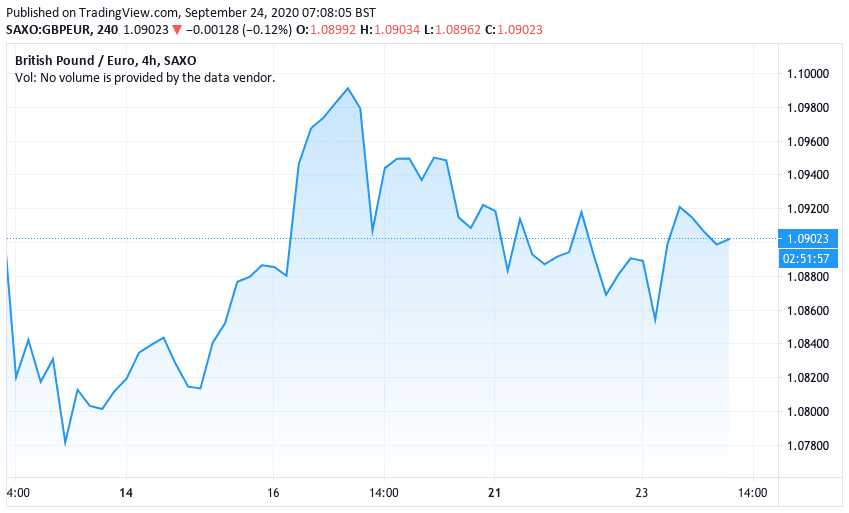Pound Sterling Supported against Euro and Dollar on Brexit Progress and Fresh Fiscal Support from the Treasury
- GBP steadies against EUR
- Brexit reports are supportive
- GBP aided by fresh economic support package
- USD outperforming as stock markets fall

Above: File image of Chancellor Sunak. Image © HM Treasury, Gov.uk
- GBP/EUR spot: 1.0948 | GBP/USD spot: 1.2749
- GBP/EUR bank rates: 1.0741 | GBP/USD bank rates: 1.2492
- GBP/EUR specialist rates: 1.0849 | GBP/USD specialist rates: 1.2634
- Learn more about market beating exchange rates, here
Reports of progress being made in ongoing Brexit trade negotiations and the announcement of further fiscal support measures by the Government have aided a recovery in the British Pound against the Euro, Dollar and other major currencies.
Michael Gove, the Cabinet's second most senior minister after the Prime Minister, told a Parliamentary select committee on Wednesday that the EU has made progress in granting the UK third country status for food exports.
Gove said this progress had come on the back of pressure from the Prime Minister, in what amounts to another key step forward in what have been difficult trade deal negotiations.
The Pound-to-Euro exchange rate (GBP/EUR) remains the litmus test for Brexit sentiment, and the pair went higher in the wake of the news.
Under the terms of the Withdrawal Agreement signed in 2019, without third country status the rest of the UK would have been unable to export food to Northern Ireland.
The UK has accused the EU of dragging its feet over the matter to gain leverage in negotiations.
To guarantee seamless trade within the UK following Brexit the UK introduced the Internal Markets Bill which contains legislation that would effectively override elements of the Withdrawal Agreement signed between the EU and UK in 2019, drawing strong criticism from the EU.
At one point in early September, when the row over the matter first broke out, the EU gave the UK a month-end ultimatum to withdraw the offending legislation.
Sterling was left reeling, suggesting some in the market interpreted this as a threat to walk away from talks.
In a further positive development, a national newspaper reported midweek that the UK will remove the contentious elements of the Internal Markets Bill in the event of a trade deal being reached between the two sides.
The developments suggest to markets a deal is still a more likely outcome than a 'no deal', and the Pound will likely find support as a result.
Above: GBP/EUR has been better supported since mid-month, with an uptick coming on Wednesday 23 on positive newsflow. (See our best euro rate finder for the various rates on offer).
A senior government source told The Times that if a deal could be struck ministers would immediately withdraw the clauses in the Bill that allow them to potentially override the Withdrawal Agreement in breach international law.
"In a move being seen as an attempt to assuage European concerns, ministers have indicated that the internal markets bill may not be debated in the House of Lords until after a make-or-break summit with EU leaders in mid-October," The Times reports.
It is reported that the UK Government is intentionally slowing the progress of the Bill, "to give negotiators as long as possible to reach agreement."
"Assuming an agreement is reached by the end of the year – not necessarily a free trade agreement, but at least a deal good enough to rule out the cliff-edge scenario, by which at the beginning of 2021... the Pound should strengthen," says Asmara Jamaleh, Economist at Intesa Sanpaolo.
Intesa Sanpaolo see the Pound rising back against the dollar to over GBP/USD 1.30. "The appreciation would also extend to the exchange rate against the euro," says Jamaleh who has GBP/EUR forecast back at 1.10 in three months.
The Times further report that despite posturing on both sides sources said that some progress had been made on the issues of subsidies and checks on goods crossing the Irish sea.
The Pound also found a bid after the Chancellor of the Exchequer Rishi Sunak announced a fresh financial support package for the economy on Thursday afternoon, with a Job Support Scheme being the flagship initiative.
"From 1 November, for the next six months, the Job Support Scheme will protect viable jobs in businesses who are facing lower demand over the winter months due to Covid-19," said Sunak in the House of Commons.
This is a six month scheme eligible to employees who work a minimum of 33% of their prescribed hours.
For remaining hours not worked, the government and employer pay 1/3 of the wages each, so employees working 33% of their hours will receive at least 77% of their pay.
The full details of this and other initiatives announced today, as well as reactions by analysts and economists, can be found here.
The move by the Government comes amidst signs the UK's economic recovery from the first covid-19 lockdown is slowing, with economists at Bank of America warning the economy would effectively stagnate for the next six months without further fiscal support.
The introduction of fresh restrictions on Tuesday to stem the spread of covid-19 will likely pull the reins back on the economy's recovery, while the ending of the jobs retention scheme in October has seen economists warn the UK's unemployment rate will rise sharply.
A cocktail of rising unemployment and subdued consumer confidence would almost certainly invite further stimulus from the Bank of England, which would in turn weigh on the British Pound.
Therefore, a strong stimulus package from Sunak would go some way in pushing back the negative narratives building around the economy, and afford Pound exchange rates some support.
However, initial responses to the Government's latest support packages have been lukewarm, suggesting the Bank will indeed have to step in.
Hinesh Patel, Portfolio Manager at Quilter Investors described Sunak's statement to Parliament as being "lacklustre", as it lacked the "targeted stimulus necessary to get economy moving in right direction".
"The government would have been better off committing further in its pledge to get Britain building and the green initiatives introduced in the Summer and going for more targeted stimulus in those sectors that have been decimated. It is going to be a long winter for some of these firms, and some, especially the airlines and events companies, will have been hoping for a lot more support," says Patel.
"The policy measures just announced by the Chancellor will go some way to cushioning the blow to the economic recovery from the new restrictions to contain COVID-19 and limiting the long-term hit to unemployment. But these actions won’t eliminate the hit entirely. That is why we think GDP will stagnate in the last three months of the year and take until end-2022 to return to its pre-crisis level," says Ruth Gregory, Senior UK Economist at Capital Economics.
Capital Economics says the fiscal support offered by the Government will unlikely be enough to keep further stimulus initiatives from the Bank of England at Bay.
"It may soon be the Bank of England’s turn to show that it is doing all it can to prevent the recovery from going into reverse in the coming months. We don’t think the Bank will use negative interest rates in the next 6-12 months. But we expect it to announce a £100bn expansion of QE by November and an extra £150bn next year," says Gregory.
Dollar Rallies Amidst Market Weakness
The U.S. Dollar continues to benefit as investors move out of stocks and into safe-haven assets, with analysts blaming the move on rising concerns over the November U.S. Presidential election.
"The British pound, Aussie dollar and gold have all fallen to 2-month lows against a resurgent US dollar, which is gaining amid rising political uncertainty," says Jasper Lawler, Head of Research at LCG.
Bloomberg reported President Trump is reluctant to commit to a peaceful transfer of power should Vice President Biden win the 3 November election, saying he believed the election "will end up in the Supreme Court".
"The President’s comments raise the prospect of a drawn‑out disputed election. The dispute about counting votes in Florida in 2000 election lasted 35 days. If the election is contested in court, market volatility could rise," says Carol Kong, a foreign exchange strategist with CBA.
But it is not just the U.S. where concerns lie, as investors are also expressing concern over Europes surge in covid-19 cases.
"The stock market continues to correct the somewhat incredible journey made in 2020 and technology stocks led broad indices lower. Unfortunately, most countries are heading for a relatively strong wave of new Covid-19 cases again after the end of the holiday season, which will call into question how strong economic recovery we will see," says Marcus Widén, Economist for the Euro area and Sweden at SEB.
"After a horrible summer for the U.S. outside of the northeast region, the news flow with respect to bad outcomes on the pandemic front is shifting slowly but surely towards Europe," says Shahab Jalinoos, a Trading Strategist at Credit Suisse.

